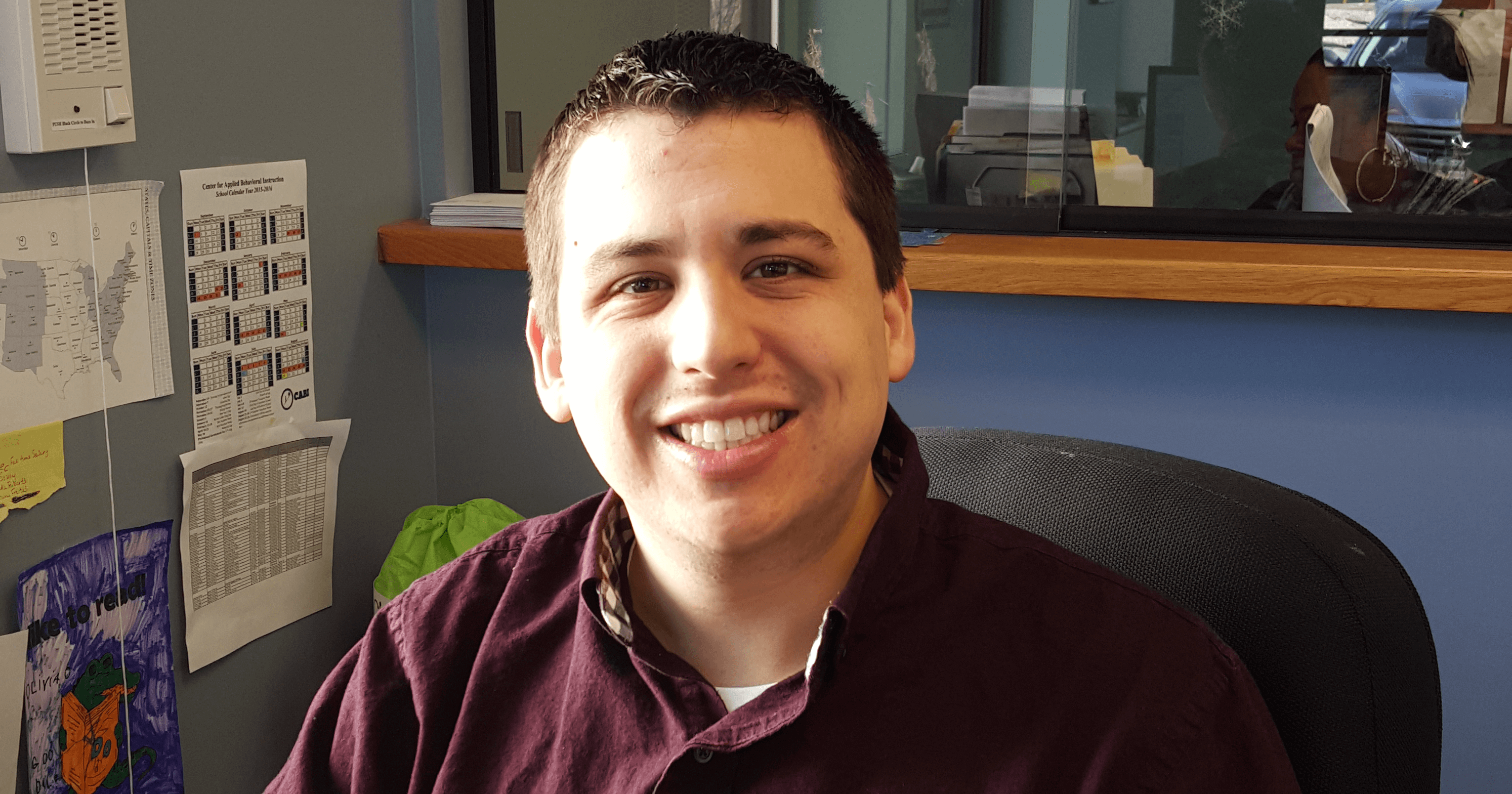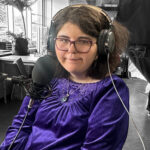Christian Tsetsos Shares Stories from His Life on the Spectrum

FEATURED POSTS
February 10, 2026
January 27, 2026
Christian Tsetsos works as an insurance authorization coordinator for the head office of LEARN’s Behavioral Concepts (BCI) in Worcester, Massachusetts, while serving, on the side, as a neurodiversity advocate and Asperger’s/autism speaker. He joined us recently to share stories from his professional and personal life with autism, delving into everything from his life growing up and struggling to make friends to his experience using dating apps and revealing autism to suitors. Here, we offer a recap of the conversation.
Q: You’ve worked for BCI now for 14 years. Tell us about your job there? What aspects of your work do you enjoy?
A: I started working part-time for BCI my last year of high school and continued as an administrative assistant at the main office, while attending college at Worcester State University. I majored in urban studies and realized I liked the human and social services side of the field. Urban studies is an interdisciplinary major that weaves in government, city systems, sociology, and even art, engineering, and psychology. So, my job at BCI involves interacting with and helping people get the services they need.
I liked my work at BCI and the safe space it gave me to develop my social and professional skills, so I stayed on to take a full-time position in 2014, after graduating from college. This was around the time that insurance policies started covering more ABA services. The company was expanding and transitioning from only providing services through school contracts to offering services in client’s homes and in clinics. To this day, I work in BCI’s first clinic.
Over the years, I’ve worked in a number of jobs at BCI—answering phone calls as a receptionist at the front desk, screening candidates for behavior techs as a human resources assistant, supporting recruiting and talking to prospective applicants at career fairs, and coordinating the intake and insurance authorization processes. I like what I do now, in the insurance side of the business, because I’m detail-oriented. Authorizations involve a ton of rules and policies and limits. Remembering and tracking endless details isn’t for everyone, but it’s something I’m good at and enjoy.
What I like most about my role, though, is the human interaction—for instance, I like helping behavior analysts when they don’t remember a particular insurance code. I like feeling needed and being part of a collaborative team.
Q: You also go to colleges and other places to talk about autism and ABA. Tell us about that experience—and how you developed the skills and confidence to put yourself out there and speak in front of crowds.
A: The man who founded BCI, Dr. Jeff Robinson, had been my mentor for many years. In fact, he’s the one who hired me at age 17 and opened the door to my career path. He worked in schools and wanted someone to speak at community colleges about the differences between high school and college—and the kinds of support available for kids with autism and other special needs. I ended up taking part in that event, which led to the Asperger/Autism Network inviting me to do a 45-minute stand-up talk in front of 50 or so K-12 educators. This was a big deal for me, and I felt both open to it and anxious.
I remember, as I stood in front of that crowd, hearing myself talking without really seeing the audience. I focused on delivering the information and probably looked frozen and stiff. Over time, I became more comfortable and got invited back to talk about my own experiences in the K-12 education system as an individual on the spectrum. I talked about various challenges, interventions that made a difference—that sort of thing. Recently, I gave a talk to a group of grandparents about what they might do to support their grandkids on the spectrum.
Q: Public speaking can be a scary experience, but you overcame your fear. What are some of the things you share, in your talks, about growing up on the spectrum?
A: I talk a lot about the social aspects of school, and how, in elementary school, my teachers knew me and understood how to support me. They even helped me make friends. But my middle school was much larger, and I didn’t know my teachers or classmates as well. I felt disconnected. My differences became more obvious to my peers, and I eventually fell into a deep depression, partly because I didn’t have friends and started struggling academically—everything was overwhelming.
Some teachers treated me like the problems were my fault. They didn’t understand that someone with autism could be smart but still have certain challenges. I have a normal IQ, which meant I didn’t qualify for many services. At the time, people tended to look at the issue in black and white terms, without understanding that someone could have a normal IQ but still have anxiety and problems with executive functioning. It was really a lack of understanding and awareness about autism. My mom advocated for me but often ran into the school saying things like, “Well, according to the law, we don’t have to accommodate that.”
As my depression worsened, my mom kicked into full advocacy mode and started figuring out how to navigate the system. She created a system of supports that helped me get through school. She also hired Dr. Robinson as a consultant to help teachers realize I wasn’t making stuff up—that autism is a real condition that creates real challenges.
One of the big things Dr. Robinson did for me was to help my teachers become more compassionate. Of course, there are always people who can see that there is a need and intervene on their own. These people are naturally compassionate. But others need help getting there.
It’s sad, looking back, that I didn’t have a single friend when I graduated from high school. It’s also disturbing that the school was OK with that.
Q: Yes, that’s really sad and disturbing, and remarkable that you found your way to a far healthier, happier place. In your own words, why do you think you struggled to make friends, and how did you eventually start making friends?
A: I didn’t learn social skills in a class. I taught myself, but not until around age 20, when I enrolled in community college. I was lightyears behind my peers but started, around that time, to open my mind to the possibility of having friends. It dawned on me, however, that I had no idea how to go about it. This was a hard realization to make because, in general, society can be judgmental if people aren’t acting a certain way, especially a grown man who looks typical.
I started trying, on my own, to work on learning social skills by putting myself in different situations. I joined various college groups and had small conversations with people to see if the conversations went anywhere. But it took trial and error. For instance, I realized I was insulting people when I said things like, “If you want to do anything with your psych major, you’ll need to go to grad school.” I learned to take a step back and think through how that might come across as offensive.
Q: With your friends today—and even on the dating scene—do you come right out and tell people you have autism?
A: I don’t think a lot of people understand autism if they’re not affected by it. Sometimes, I’m hesitant to come out with it, though I know that telling might open the door to more understanding and compassion. At the same time, I know there’s a lot of misunderstanding about being on the spectrum. People tend to think of it as an intellectual disability, which automatically means I have a lower IQ, I can’t live on my own, I don’t have a job, and I don’t have a partner. That’s just not true.
I have most of those things, in fact. I’m single at the moment but have been on a long quest to find a partner. I went on a lot of dates last summer—really put myself out there. I’m gay and stay active, on and off, on some dating sites. I tend not to mention autism on the first date but do mention it later, and gauge the reaction. As a side note, I encounter plenty of people who are likely on the spectrum but don’t realize they’re on the spectrum—not necessarily on dates but just in general. It’s interesting.
Q: That is interesting. You’ve developed a heightened self-awareness that plenty of people lack. Aside from that, what are some advantages of being on the spectrum that most people don’t realize?
A: One positive is being able to remember certain facts and figures, like I can do in my job now, with the details of insurance rules and policies. As a kid, I would memorize what states border other states, and what towns border other towns. That’s a unique skill.
Q: What do you wish more people understood about autism?
A: People tend to think of autism as something far removed from their lives or something they only encounter on TV. In reality, autism is part of our society. I wish people could understand that there are many people out there in the world on the spectrum, in our everyday lives at work, college, everywhere. It helps to be aware of that and open-minded and accepting of those who come across as different.
I also think some people don’t want to be friends with someone with autism, and I wish that wasn’t the case. At one point in college, I was struggling academically and socially—it was obvious to the rest of the class, so I came out with my diagnosis. Instead of lending a hand, they didn’t know what to do and ended up avoiding me. I’ve had positive experiences, but it was disappointing that my classmates and my professor treated me like a nuisance. Having a teacher or classmate say, “We’re going to help you succeed,” could have done so much.
So, I would say that I wish people felt more comfortable talking about autism, instead of shying away or feeling afraid. What I really wanted, in that instance, is for people to open up and lend a hand.
Q: It really comes down to what you mentioned earlier about natural compassion, versus trained compassion. Is that fair to say?
A: Yes, it’s really about educating people in compassion. That’s what I try to do with my talks. Whether people have it naturally or need to be taught, compassion can go a long way.





